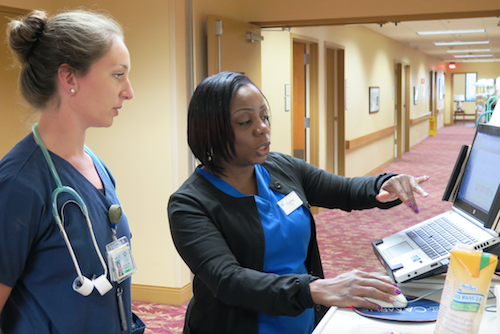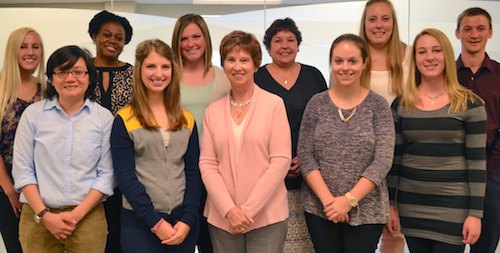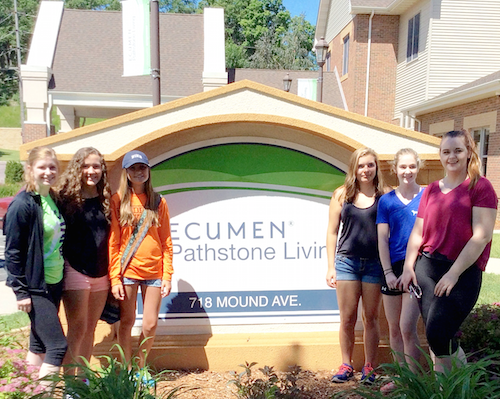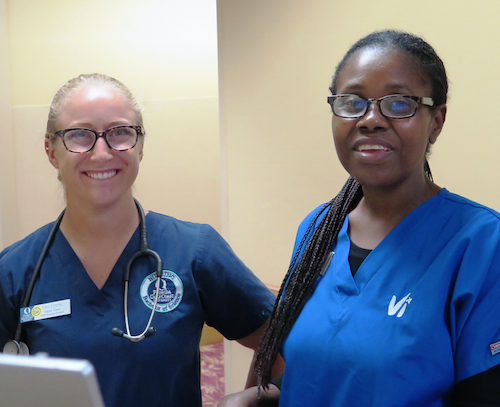
Some senior living providers are forging relationships with educational institutions to try to ensure sufficient numbers of professional caregivers for the future.
At Shoreview, MN-based Ecumen, a $1.95 million grant from the Margaret A. Cargill Foundation grant is enabling the organization to conduct a two-year pilot study of the effectiveness of such workforce development endeavors. Ecumen is just beginning to examine data from the effort, which will end this summer, but anecdotal evidence suggests that is has been “overwhelmingly successful,” Judy Blaseg, Ecumen’s vice president of philanthropy, told McKnight’s Senior Living.
Workforce development holds the top spot on Argentum’s list of challenges facing senior living, the organization’s president and CEO, James Balda, told McKnight’s Senior Living. Argentum’s “Getting to 2025: A Senior Living Roadmap” report, released earlier this year, indicates that through 2025, the senior living industry will need to hire 1.2 million new employees to serve the increasing number of older adults becoming senior living residents and to replace existing workers who will leave their jobs. That number includes 278,599 nursing assistants, 39,000 licensed practical nurses and licensed vocational nurses, and 25,600 registered nurses.
Minnesota, home to many senior living communities, is forecast to need more than 31,000 new and replacement senior living workers by 2025. The entire industry, of course, already is being affected by costs related to hiring temporary workers to replace departed ones as well as recruiting and training permanent successors, Blaseg said.
“We oftentimes can’t admit residents because we don’t have enough staff at that time,” she said. “So this is a critical issue for us and many others in the industry, and it’s only going to increase. This isn’t a problem that we see going away soon.”
But the staffing crisis is especially acute in rural areas, Blaseg said. Across the country, as the population ages, more people need senior living but fewer people are available to work in the industry. Rural areas, however, are “the canary in a coal mine,” she said. “They’re feeling it before we start to feel it in the urban areas,” and the problem is compounded when potential workers leave for the city.
To stem the tide, Ecumen’s pilot program has welcomed about 300 CNA, LPN, RN and other caregiver students for their clinical rotations at 10 communities in rural areas — mainly in Minnesota and North Dakota but also in Idaho. Students came from 16 community colleges, technical colleges and state universities that are part of the Minnesota educational system.
“We find that once a student comes and does their clinical rotation in senior care, they like it,” Blaseg said. “They enjoy getting to know the resident. They have a longer-term relationship with the individual. In the hospital setting, it’s shorter.”
After a year, Ecumen adjusted the demonstration project to enable students to obtain their experience via Ecumen Home Care at an Ecumen assisted living community or in homes in the general community, too. “We know that’s on the horizon as an area where we really need to build up staffing,” Blaseg said.
Not only has the pilot program exposed caregiver students to the possibility of a career in senior living, but through the grant, Ecumen also is able to offer bonuses to students who decide to join the company after they graduate. The bonus schedule provides for extra income after one year, five years and 15 years of service.
 The pilot also included a summertime Ecumen Scholars program, intensive training for 10 people studying to be registered nurses. Participants (pictured with Ecumen President and CEO Kathryn Roberts, center, bottom row) also were exposed to careers in administration, corporate finance and other areas.
The pilot also included a summertime Ecumen Scholars program, intensive training for 10 people studying to be registered nurses. Participants (pictured with Ecumen President and CEO Kathryn Roberts, center, bottom row) also were exposed to careers in administration, corporate finance and other areas.
“We showed them different career paths, because lots of people here at Ecumen have nursing degrees but are doing other types of work,” Blaseg said.
In the end, the Ecumen Scholars learned that senior care can be “interesting and complex,” she said. “They had [residents] who presented with congestive heart failure, diabetes and maybe just had a hip replacement,” she said. “Those are three things they may not see in a hospital setting. They may just see one of those.”
Most if not all of the Ecumen Scholars are pursuing careers in senior care, Blaseg said. They now know that “it’s a nice place to work. They’ve already been there, They have no more bias against it,” she said. “And they, like all of us, love the long-term relationships with the residents.”
Provider, educators learn, too
The pilot program hasn’t just educated students; Ecumen and its college partners have learned much through the experience, too.
“What we learned was, it wasn’t necessarily the students who didn’t want to work in senior care. It was their instructors who were pushing them away from senior care, pushing them toward hospitals,” Blaseg said. The state boards expect graduating students to have mastered certain core competencies, and many instructors mistakenly thought that those clinical skills had to be learned at hospitals, she added.
“What we were able to figure out was, those [skills] all can be obtained at Ecumen sites, so we’ve now taken a much different approach with the instructors to try to get at that bias,” Blaseg said. And Ecumen is examining curricula of area programs for professional caregivers to see whether opportunities exist to add geriatric care topics to them.
Ecumen is committed to sustaining the program even after the pilot ends, she said. “It’s just been so successful.”
And the organization knows that its efforts will benefit other providers, too. “What we like to say is, we’re creating a ‘nursing pipeline’ for our communities,” Blaseg said. “Some of these students will not come back to Ecumen. They’ll go to other senior care communities, and that’s just fine with us. A grant of this magnitude to do this type of work, we know impacts everyone.”
Other approaches pursued
 Ecumen is approaching workforce development in other ways, too. Under the grant from the Margaret A. Cargill Foundation, high school-aged children of Ecumen employees (some of whom are pictured) in one rural area were invited to attend an existing week-long “scrubs camp,” where they were exposed to careers in a variety of healthcare settings, including senior care. The program is being expanded to benefit children of employees of some additional communities, Blaseg said.
Ecumen is approaching workforce development in other ways, too. Under the grant from the Margaret A. Cargill Foundation, high school-aged children of Ecumen employees (some of whom are pictured) in one rural area were invited to attend an existing week-long “scrubs camp,” where they were exposed to careers in a variety of healthcare settings, including senior care. The program is being expanded to benefit children of employees of some additional communities, Blaseg said.
Also, based on the success of the pilot program in rural areas, Ecumen sought and obtained a $30,000 grant from the Richard M. Schulze Family Foundation to test a similar program in urban areas. The Schulze grant enabled about 24 student nurses and physician assistant hopefuls from public and private colleges to work in assisted living, memory care, rehabilitation and long-term care at several Ecumen communities in metropolitan areas. The program included gas cards for student participants, to help the them commute to work, rather than factoring in bonuses for those who stayed.
Meanwhile, in Florida…
Argentum forecasts that Florida, another popular location for senior living communities, will need more than 130,000 new and replacement senior living workers by 2025. There, in Naples, continuing care retirement community Vi at Bentley Village is serving as a clinical rotation location for gerontologic nursing students who are part of nearby Florida Gulf Coast University’s bachelor of science in nursing program.
“This association provides benefits to both our residents and the students of FGCU,” Vi at Bentley Village Executive Director Ann Walsh said in a statement. “Our residents receive additional time with clinical staff while in our care center, and the students receive invaluable learning experience through direct care and job-shadowing opportunities.”
Fifteen students and two instructors visit the care center every week and are participating in two seven-week clinical rotations through the revived collaboration. (Pictured below: FGCU student Taylor Fitori, left, works with Vi at Bentley Village nurse Naderge Lucienord.)
 Mitchell Cordova, Ph.D., professor and dean of FGCU’s College of Health Professions and Social Work, said the college is “particularly excited about the uniqueness of this relationship as an innovative, integrated approach to developing a comprehensive teaching and learning environment for faculty and students within the BSN program.”
Mitchell Cordova, Ph.D., professor and dean of FGCU’s College of Health Professions and Social Work, said the college is “particularly excited about the uniqueness of this relationship as an innovative, integrated approach to developing a comprehensive teaching and learning environment for faculty and students within the BSN program.”
The students working at Vi at Bentley Village receive assignments with the CCRC’s nurses or within the activities department, assisting with group events, attending care-planning meetings, helping measure residents’ vital signs and lending a hand with some activities of daily living (they are not permitted to pass medications or assist with transfers).
“We want to provide an atmosphere of learning, offering the students a comprehensive overview of whole-body wellness, from nursing and therapy to social services and activities,” said Krystal Garrell, Vi at Bentley Village staff development coordinator. “It’s important for them to understand that these departments work together to provide care for the residents.”



